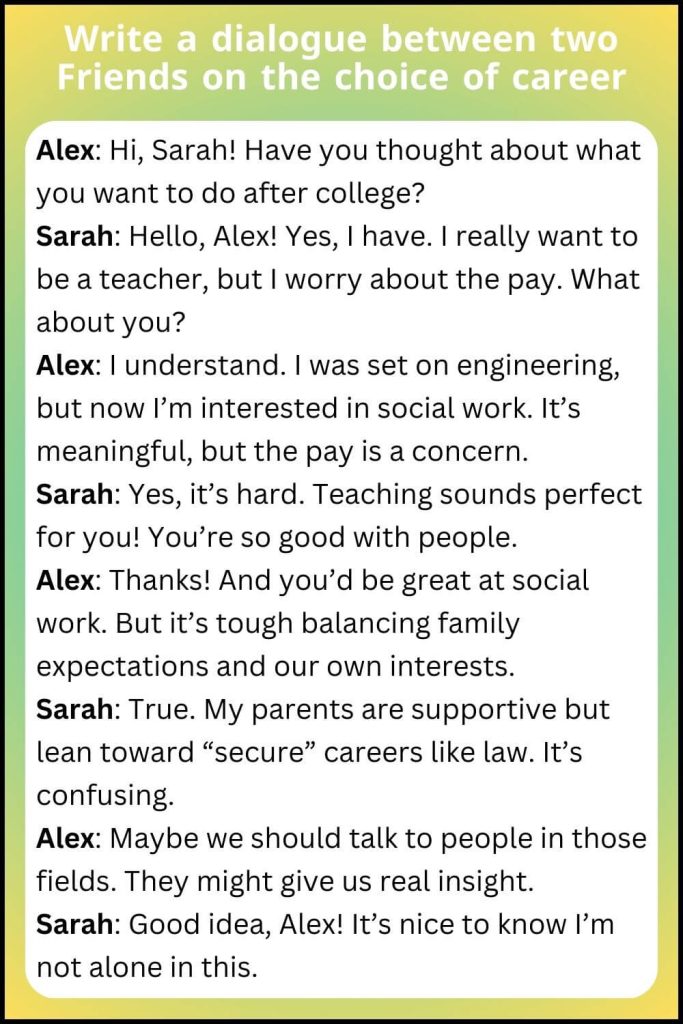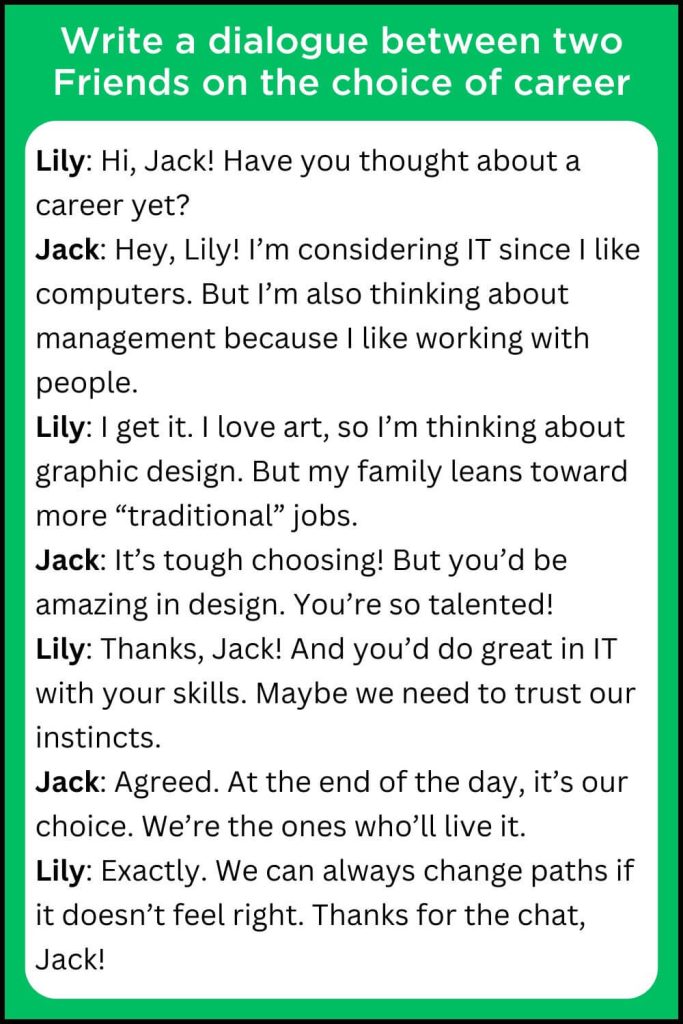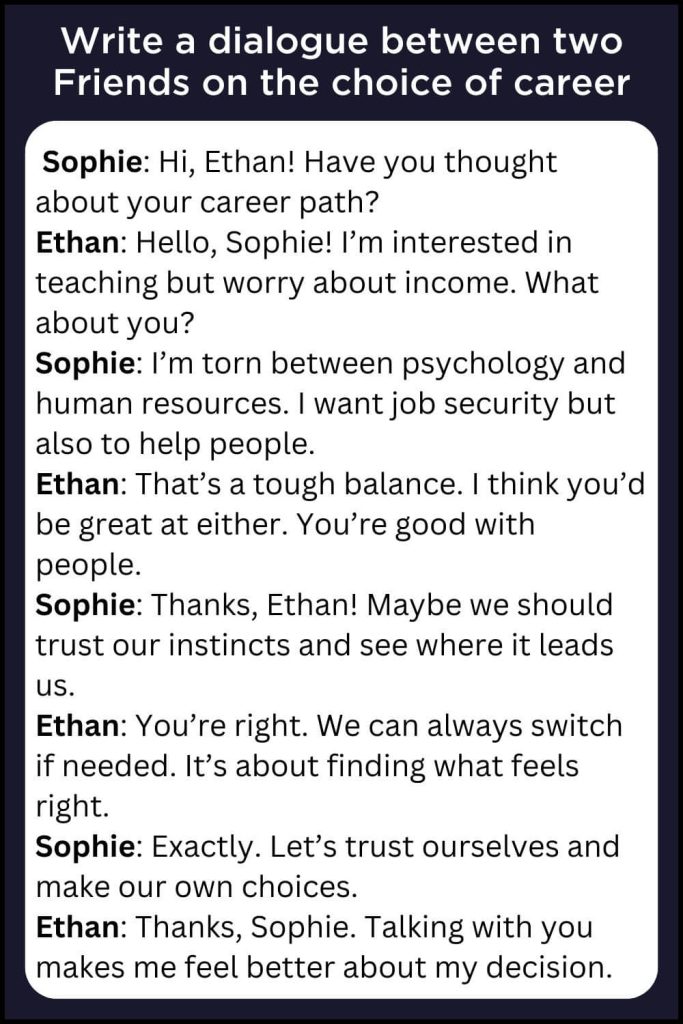Sample Dialogue 1: Write a dialogue between two friends on the choice of career
Alex: Hi, Sarah! Have you thought about what you want to do after college?
Sarah: Hello, Alex! Yes, I have. I really want to be a teacher, but I worry about the pay. What about you?
Alex: I understand. I was set on engineering, but now I’m interested in social work. It’s meaningful, but the pay is a concern.
Sarah: Yes, it’s hard. Teaching sounds perfect for you! You’re so good with people.
Alex: Thanks! And you’d be great at social work. But it’s tough balancing family expectations and our own interests.
Sarah: True. My parents are supportive but lean towards “secure” careers like law. It’s confusing.
Alex: Maybe we should talk to people in those fields. They might give us real insight.
Sarah: Good idea, Alex! It’s nice to know I’m not alone in this.

Sample Dialogue 2: Write a dialogue between two friends on the choice of career
Ryan: Hi, Emma! Thought about your career yet?
Emma: Hey, Ryan! I have. I’m interested in journalism, but I’m worried about job security. What about you?
Ryan: Same here. I want to study environmental science, but I worry about job options. Every career has its risks, I guess.
Emma: True. Sometimes I think about going into business instead. But I’d miss doing something creative.
Ryan: My parents remind me to stay realistic, but I also want to enjoy my work.
Emma: Maybe we should try internships. They could help us understand if these fields are right for us.
Ryan: Great idea! It’ll help us build experience too. Thanks, Emma. This talk really helps.
Sample Dialogue 3: Write a dialogue between two friends on the choice of career
Lily: Hi, Jack! Have you thought about a career yet?
Jack: Hey, Lily! I’m considering IT since I like computers. But I’m also thinking about management because I like working with people.
Lily: I get it. I love art, so I’m thinking about graphic design. But my family leans towards more “traditional” jobs.
Jack: It’s tough choosing! But you’d be amazing in design. You’re so talented!
Lily: Thanks, Jack! And you’d do great in IT with your skills. Maybe we need to trust our instincts.
Jack: Agreed. At the end of the day, it’s our choice. We’re the ones who’ll live it.
Lily: Exactly. We can always change paths if it doesn’t feel right. Thanks for the chat, Jack!

Sample Dialogue 4: Write a dialogue between two friends on the choice of career
Mia: Hi, James! Any career plans after graduation?
James: Hey, Mia! I’m interested in marketing, but finance is also an option. What about you?
Mia: I want to work in healthcare, maybe as a nurse or therapist. It’s hard to choose.
James: Both are great choices. Helping people is meaningful. Do you think you’d enjoy it long-term?
Mia: I think so, but it can be demanding. I want to be sure.
James: Maybe talking to people in those fields would help. It could make things clearer.
Mia: That’s a good idea. And you should reach out to people in marketing or finance too.
James: I will. Thanks, Mia! It’s so helpful to talk this over.
Sample Dialogue 5: Write a dialogue between two friends on the choice of career
Sophie: Hi, Ethan! Have you thought about your career path?
Ethan: Hello, Sophie! I’m interested in teaching but worry about income. What about you?
Sophie: I’m torn between psychology and human resources. I want job security but also to help people.
Ethan: That’s a tough balance. I think you’d be great at either. You’re good with people.
Sophie: Thanks, Ethan! Maybe we should trust our instincts and see where it leads us.
Ethan: You’re right. We can always switch if needed. It’s about finding what feels right.
Sophie: Exactly. Let’s trust ourselves and make our own choices.
Ethan: Thanks, Sophie. Talking with you makes me feel better about my decision.

FAQ
1. Why is choosing a career so important?
Choosing a career is crucial because it determines a significant part of your life, from daily work to long-term satisfaction and financial stability. A career affects personal growth, lifestyle, and even the relationships and experiences you may have.
2. How do I know which career is right for me?
To find a career that suits you, start by assessing your interests, skills, and values. Consider what subjects or activities excite you, and take time to research related careers. Trying internships, talking to professionals, and using career assessment tools can also provide valuable insights.
3. Should I choose a career based on my interests or job stability?
Ideally, a balance between interest and stability is best. Pursuing a career you enjoy can lead to long-term satisfaction, but considering job security and demand in that field is also important. Many fields offer ways to blend passion and stability.
4. What should I do if I’m unsure about my career choice?
If you’re uncertain, explore different fields through internships, part-time jobs, or volunteer work. Talking to career counselors and mentors can also help you clarify options. It’s okay to take time to decide and adjust your path as you learn more.
5. How can I discuss my career choice with my parents if they have different expectations?
Approach this conversation openly and respectfully. Explain your interests and how the career you’re considering aligns with your goals. Listening to their perspective can help, too. You may also suggest meeting a career counselor together to explore options.
6. Can I change my career later in life if my interests change?
Yes, many people switch careers at different stages of their lives. Lifelong learning, online courses, and certification programs make it easier to transition into new fields if you find your interests evolving over time.
7. What if my chosen career doesn’t work out as planned?
Career paths aren’t always linear, and it’s common to face setbacks or unexpected challenges. If things don’t go as expected, re-evaluate your options, consider related fields, and don’t be afraid to pivot or seek guidance from mentors.
8. How important is a college degree in choosing a career?
A college degree is important for some fields but not for all. Many industries, like tech and creative fields, value skills, portfolios, and experience as much as formal education. Research the qualifications in your field of interest to know what’s required.
9. Should I follow my friends’ career choices?
It’s best to choose a career based on your unique interests, skills, and goals rather than following friends. While friends can offer advice and support, remember that each person’s strengths and aspirations differ.
10. Are there tools or assessments that can help me choose a career?
Yes, there are several career assessments like the Myers-Briggs Type Indicator (MBTI), Strong Interest Inventory, and Holland Code that can provide insights into your strengths and preferences. Many online platforms and school career centers offer free assessments.
11. How can I research different careers?
You can research careers by reading online resources, job descriptions, and industry reports. Websites like LinkedIn, Glassdoor, and the Bureau of Labor Statistics offer information about job roles, salaries, and growth prospects. Speaking with professionals in those fields is also valuable.
12. What if I want a career that’s less traditional?
Non-traditional careers, like freelancing, content creation, and entrepreneurship, are becoming more common and offer flexible options. Explore these areas, build relevant skills, and consider ways to establish a stable income. Research and networking can provide insight into less traditional paths.
13. How do I handle the pressure of making the “right” choice?
It’s normal to feel pressure, but remember that your career path is adaptable. Focus on making a well-informed decision that feels right for you now, knowing you can adjust as you grow and learn more. Talking to others and setting small goals can ease the pressure.
14. What are some practical steps to take when deciding on a career?
Start by listing your interests, researching potential careers, and looking into required skills and qualifications. Seek internships or shadowing opportunities, and talk to people working in your field of interest. Break down your decision-making into manageable steps to avoid feeling overwhelmed.
15. How can I keep my options open if I’m still undecided?
You can keep your options open by building general skills like communication, teamwork, and problem-solving, which are valuable across many fields. Explore different subjects, stay open to new experiences, and don’t feel pressured to choose immediately.

